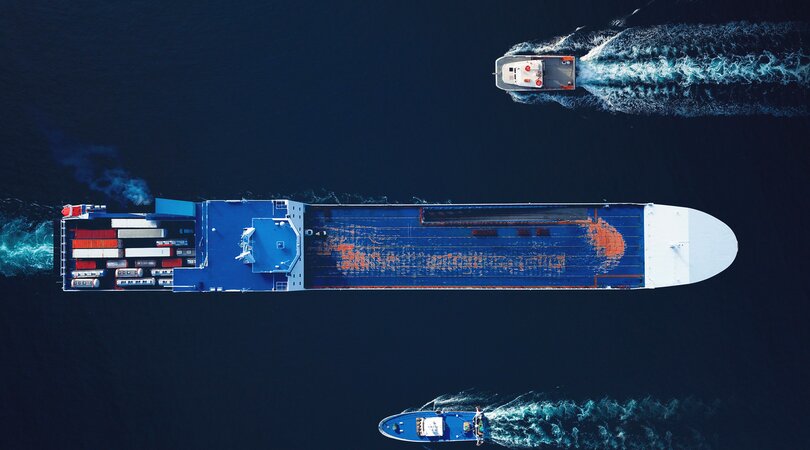Our new NorthStandard site is now live. There will be no new content or updates added to this site. For the latest information, please visit our new site north-standard.com.
Case law: London Arbitration 27/22
Key topics: Off-hire, Covid-19

Off-hire – Vessel quarantined due to crew with Covid-19 – Whether charterers liable for time lost to quarantine procedures
The case involves a hire dispute, during the quarantine period, under a trip time charterparty from South America to the Far East.
On 12 April 2020, the vessel arrived at the loading port where it was quarantined until 1 May 2020. Prior to the arrival at the loading port, the third engineer was recorded in the medical log as suffering from ‘COUGHING – DRY’. Similar records were made on 21, 22, 27 March and 30 March.
On 28 March 2020, the master submitted all the necessary pre-arrival documents to the port agents, including the medical log. As the third engineer’s had one symptom of Covid-19, the port health authorities postponed the granting of free pratique, which would only be granted after berthing and upon an inspection on the ship confirming that all the crew was healthy.
On 17 April 2020, the crew was tested for Covid-19 using rapid antibody tests. All crew members were tested negative , except for the bosun who tested positive for antibodies. Following this, the vessel was ordered to quarantine for 14 days.
On 22 April 2020 the bosun had a negative PCR test, however, the port health authorities refused to release the vessel from quarantine.
The charterparty contained three relevant clauses.
Clause 15: ‘That in the event of the loss of time from default and/or deficiency of men including strike of officers and/or crew or deficiency of … stores, fire, breakdown or damages to hull, machinery or equipment, grounding, detention by average accidents to ship or cargo, drydocking for the purpose of examination or painting bottom, or by any other cause preventing the full working of the vessel, the payment of hire shall cease for the time thereby lost …’
Clause 78 – Pestilence and Illness: ‘Normal quarantine time and expenses to enter port shall be for Charterers’ account. Any extra time or detention and/or expenses for quarantine due to pestilence and illness of the vessel’s Master, Officers and crew shall be for Owners’ account but if quarantine detention is due to the vessel having been sent by Charterers to an infected port, such detention time and expenses shall be for Charterers’ account.’
Clause 114: ‘Notwithstanding anything in this charter to the contrary, in the event that, at any time during the currency of this charter, the vessel suffers any loss of time (directly or indirectly) in connection with procedures (including, but without limitation, inspections and/or quarantine and/ or disinfection) imposed on the vessel, cargo or officers/ crew by any port authority or other authorized authority, body or agency, in order to combat avian influenza (or other similar disease) (influenza procedures), the vessel shall not be off hire for any such loss of time and any such loss of time (and the consequences of any such loss of time) shall be for charterers account and, irrespective of whether or not there has been any loss of time charterers shall be liable for the cost of all such influenza procedures which may be charged to or levied against the vessel or owners or officers/crew or cargo provided always that the vessel shall be off hire in respect of any such loss of time and shall be responsible for all influenza procedure costs which arise solely as a consequence of the vessel’s or officers/crew’s history prior to delivery under this charter …’
The owners argued that clause 114 applied, which precluded application of clauses 15 and 78. Although the charterers accepted that clause 114 was engaged on the facts, they sought to rely on the exception provided in clause 114 in that the quarantine arose solely as a consequence of the crew’s history.
The tribunal found in owners’ favour and held that:
- by the incorporation of the words ‘Notwithstanding anything in this charter to the contrary’, the parties had contemplated the clause to operate as a complete code, and therefore clauses 15 and 78 did not apply.
- the burden was on charterers to bring themselves within the exclusion in clause 114 that is to show that on the balance of probabilities the quarantine procedures resulted from the crew’s history. Upon assessment of the evidence, the cause of the imposition of the quarantine was not the medical log recording the symptom of the third engineer. In fact, the port health authorities had shown no further interest in the third engineer after his negative test. The tribunal concluded that if the bosun had not tested positive, it was highly likely that the port health authority would have not ordered the vessel to quarantine. Therefore, the quarantine did not arise as a result of the crew’s history and the charterers had failed to bring themselves within the exception of clause 114.
Comments
The decision is a useful reminder of (i) the effect that the words ‘Notwithstanding anything to the contrary’ will have in a contract and especially when assessing multiple clauses (including rider clauses) that purport to deal with the same issue, and (ii) that when a party seeks to rely on an exception clause, the burden is on this party to bring itself within the exception. Further, this once again illustrates how tribunals will apply the clauses to the underlying facts and events, rather than follow a local authority’s interpretation and response, which can at times (with the benefit of hindsight) seem excessively cautious, even if for understandable reasons given the sensitive times.
Category: Caselaw
